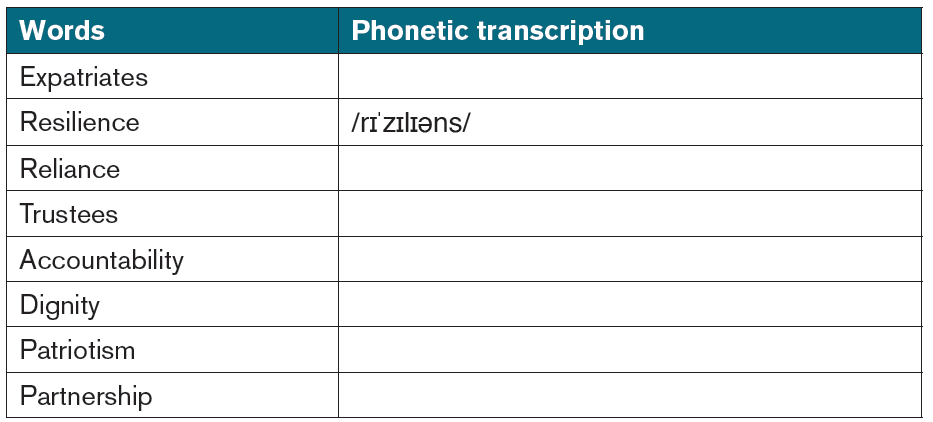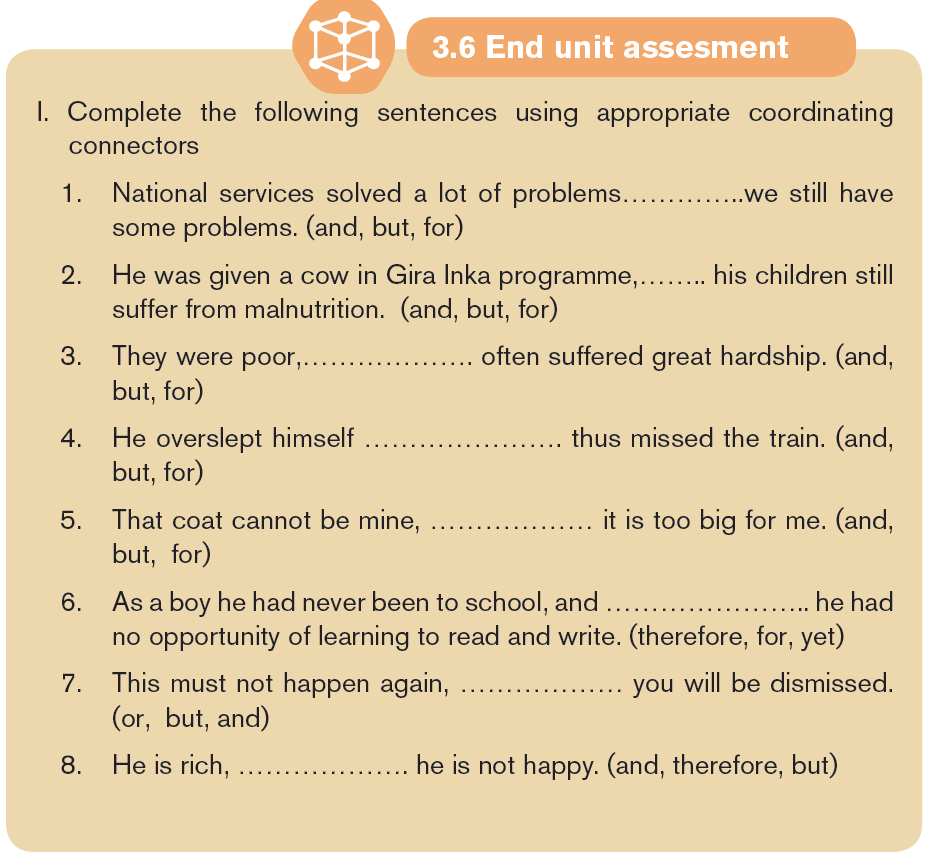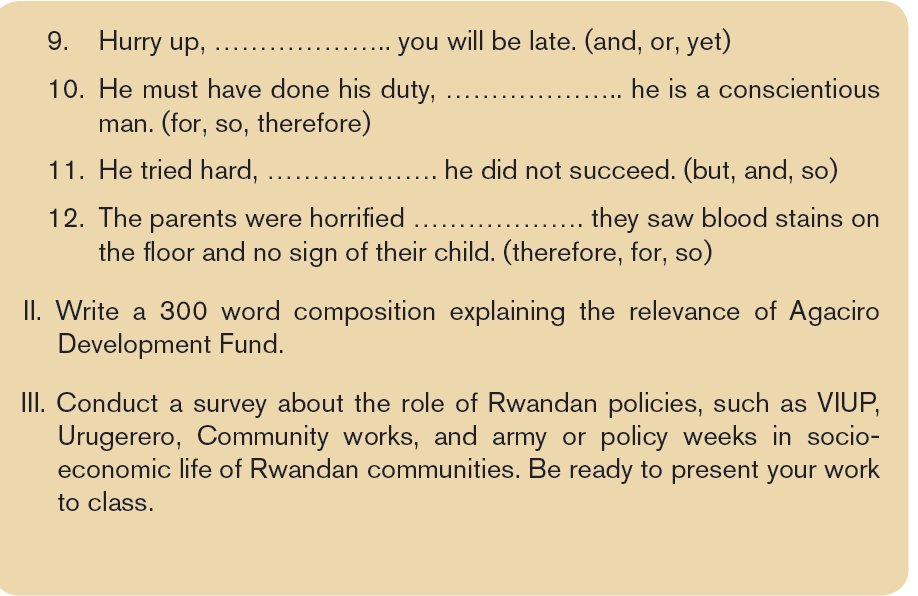UNIT3 NATIONAL SERVICES AND SELF-RELIANCE


Text 1: Rwanda’s self-reliance
Frederick Golooba-Mutebi, the researcher of Effective States and Inclusive
Development (ESID) spends half of his time in Rwanda and believes that one
big idea there is self-reliance. ESID Research centre is a global partnership
investigating the kinds of politics that promote development. “Rwandans want
to free themselves from anything that feels like domination,” he argues.
“We’re not saying we can do without external assistance, but we don’t want to
be imposed upon and dictated to in return for help.” Paul Kagame is reported to
be a proponent of this idea. He has called on Rwandans to have a mind-set of
self-reliance and aim for social and economic independence, instead of relying
on other countries. The idea of self-reliance also seems to be associated with
the idea of dignity. Kagame is reported to have said that Rwandans deserve
dignity and without it they wouldn’t have overcome the challenges facing the
country.
“There is a Kinyarwanda word, ‘agaciro’, that means dignity and it’s a word
that’s used fairly regularly both in and out of government in Rwanda,” says
Golooba-Mutebi. “There is no dignity in being dependent on outsiders and the
poor want to think of themselves as a dignified poor.”
So what has shaped these ideas of self-reliance and dignity? Golooba Mutebi
believes that the refugee experience of some of Rwanda’s ruling elites is key.
Some of the elites, along with their parents, were forced out of Rwanda from
the late 1950s to the 90s. Others were born in exile and grew up there. As
refugees they were treated as second class citizens, being denied opportunities
for things such as education.
There was also the feeling that the world had not treated their plight with the
attention it deserved and that after they had been forced out of the country,
they were ignored. “That is what pushed them to find their own solution to
their predicament” says Golooba-Mutebi. They tried to negotiate their return to
Rwanda and when that failed, they decided to go back by force of arms. They
had been ignored as refugees for a long time and they had nothing to do but
force their way back to the homeland. All together, they were familiar with living
on their own.
Golooba-Mutebi believes that this legacy has created the mentality amongst
Rwandans that at the end of the day they are on their own. They feel the world
owes them nothing, so they must find a way of developing Rwanda that allows
them to live on their own terms. Golooba-Mutebi also believes that these ideas
shape development.
“Rwandans realise that they will never be able to attain the autonomy they crave
if they don’t pull the country out of poverty and develop it to reach a stage where
they can pay their way.
“Dignity derives from doing things for yourself. But how do you get to the position
of doing things for yourself? You get there by having a strong economy, and a
healthy and educated population. So self-reliance is the central idea driving a
great deal of things that Rwandans are aspiring to do. The things that will enable
them to live like dignified people.”
Adapted from “Agaciro”, the Kinyarwanda word for dignity : “Ideas of self-reliance in
Rwanda”, by Anna Webster.
•• Comprehension questions :
1. In your own words define the term “self-reliance”
2. Can Rwanda accept external help? Justify your answer using an evidence
from the passage.
3. What according to Golooba-Mutebi has shaped these ideas of selfreliance
and dignity?
4. In the sixth paragraph the writer uses the word “legacy”. What does it
refer to?
5. Explain how the ideas of self-reliance and dignity have changed Rwandan
mindsets?
6. According to Golooba-Mutebi, how does one get to the position of doing
things for themselves?
Text 2: Youth volunteers contribution valued at Rwf 630 million
One writer said that “youth are powerful. They represent courage with wisdom
and energy which will empower to drive change and take leadership”.
It’s a character that has come to define one youth umbrella group {Rwanda
Youth Volunteers in Community Policing Organisation, RYVCPO}, composed
of over 250, 000 young and energetic people that seek to drive the national
Security and the developmental Agenda.
“Our country has invested in us through education, taught us good values of
patriotism, partnership and set the agenda through which everyone should be
involved towards sustainable security and development; that’s what drives us
since we started in 2013 with not more than 300 members,” says Jean Bosco
Mutangana, one of the pioneers and currently in charge of mobilisation and
training in the youth group.
According to a report, human Security and Community developmental Activities
conducted by the youth volunteers since 2013 are valued at over Rwf630
million. These include construction and rehabilitation of 13308 houses for the
disadvantaged families, construction and rehabilitation of 1440km of roads
linking communities, construction of 1989 toilets, and planted over 67800 trees
as part of the afforestation and environmental conservation programme.
Others include 5321 organic gardens, locally known as akarima k’igikoni, making
115,000 bricks, and 3200 metres of water trenches; paying medical insurance
premium for 284 people and raising awareness against crimes and drug abuse,
in particular, as well as donating heifer under the “One cow per poor household
programme”.
“We want to drive change among the young generation and be the voice and
power of transformation, that’s why we want to increase the membership to
at least one million in the next one year; we believe the higher the number the
more impact in our human Security and developmental activities,” says Justus
Kangwage, the national coordinator of RYVCPO.
In November last year (i.e. 2017), the youth volunteers started a special
communal exercise – Umuganda – which they conduct at least twice every
month to supplement the usual nationwide monthly exercise conducted every
last Saturday of the month.
“We set this special Saturday aside to support the poor, build them houses,
raise awareness in schools and communities against crime, construct and
rehabilitate roads, toilets and get involved in environmental conservation
activities,” Kangwage explains.
The Director General in the Ministry of Local Government in charge of Social
Affairs and Community Development, Sheikh Hassan Bahame, said that the
activities of the youth volunteers supplement the national budget and community
development.
Adapted from The New Times’ article, published on January 24, 2018, and retrieved fromhttps://www.newtimes.co.rw/section/read/228225.
•• Comprehension questions :
1. What does the journalist mean by “one youth umbrella group”?
2. Using evidence from the passage, prove that Rwanda Government cares
about the youth.
3. Appreciate the contribution of human security and community development
activities conducted by the youth volunteers since 2013.
4. Indicate the reasons why RYVCPO would like to increase the membership.5. When was the article above published ?


Text 1: Agaciro Development Fund (AGDF)
Agaciro Development Fund is the Rwanda’s sovereign wealth fund that was
initiated by Rwandans on 15-16 December 2011 at the 9th National Dialogue
Council chaired by His Excellency, the President of the Republic of Rwanda
Paul Kagame. The Fund was then launched officially by President Kagame on
23 August, 2012. The name “Agaciro” conveys the idea of “Dignity” which
was embraced as Rwanda’s key moral value in its journey towards sustainable
socio-economic development.
The Fund was set up to build up public savings to achieve self-reliance, maintain
stability in times of shocks to the national economy and accelerate Rwanda’s
socio-economic development goals. The Fund is unique of its kind as it was
created basing on voluntary contributions from Rwandans at home and abroad
as well as friends of Rwanda while other sovereign wealth funds around the
world have traditionally relied on budget surpluses, oil and mineral revenues for
their constant growth.
The Agaciro Development Fund was registered with Rwanda Development
Board (RDB), as a trust on 01 August, 2013 under code 103050268 and runs
its operations in accordance with Law No20/2013 of 25/03/2013 regulating the
creation of trusts and trustees. On 11 September, 2013, the Cabinet meeting
chaired by President Kagame, approved the proposal for the management of
the Fund’s proceeds and appointed its Chief Executive Officer. On 28 March
2014, the Cabinet meeting appointed the Fund’s Board of Trustees.
Therefore, Agaciro Development Fund is managed by the Board of Trustees
that was appointed by the Cabinet on 28 March 2014. The Trustees are
experienced persons with a variety of expertise in different areas of economy
who are appointed from public and private sector. The Board is responsible for
the oversight and management of the Fund’s operations on behalf of Rwandans.
The Board is accountable to the Government of Rwanda, through the Ministry
of Finance and Economic Planning, in ensuring that the Fund complies with
the law and the highest standards of corporate governance. On daily basis,
the operations of the Fund are run by the management headed by the Chief
Executive Officer who is also accountable to the Board.
Since its establishment, the AGDF has relied on contributions from Rwandans
and friends of Rwanda. The AGDF has singled out as its core mission, the
incremental of the AGDF to the levels of the fiscal reserves that may strengthen
Rwanda’s resilience in times of adverse economic conditions. Rwandans have
thus endowed the fund with the mandate of investing the collected funds to
produce sizeable returns, as well as engaging with Rwandans and their friends
to encourage more contributions to the Fund.
The first Board meeting was held on 11 August 2014. One of the major
resolutions taken at the meeting was that the fund be invested immediately.
Presently, the fund is invested in local market, into commercial banks as term
deposits and treasury bonds.
“Looking ahead, we remain optimistic on the future of the Fund. Our staff
continues to demonstrate tremendous enthusiasm, drive and commitment.
We will endeavour to continue building on accountability and transparent
management that we have nurtured since AGDF’s inception. However, whist we
keep momentum to secure high long-term real return of the fund, and are highly
appreciative of the contributions that have been made to AGDF by Rwandans
and friends of Rwanda, it is worth mentioning that the Fund’s sustainability
remains reliant on its ownership by Rwandans.
It is therefore important that a culture of voluntary contributions to the Fund be
fostered.” Says the Chief Executive, Office of AGDF
Adapted from http://agaciro.rw/index.php?id=34.
•• Comprehension questions :
1. What do you understand by Agaciro Development Fund (AGDF)?
2. Explain the reason why Agaciro Development Fund was set up.
3. Account for the uniqueness of Agaciro Development Fund.
4. Appreciate the management of Agaciro Development Fund.
5. Describe responsibilities of the Board of Trustees in Agaciro Development
Fund.
6. How does AGDF use the collected funds?
7. Evaluate the contribution of Agaciro Development Fund to the
improvement of life standards of Rwandans.
Text 2: Performance Contract National Program
The Performance Contract National Program was re-initiated by Rwanda’s
President, Paul Kagame, in March 2006. This was as a result of the concern
about the speed and quality of execution of government programs and priorities.
The government’s decentralization policy required a greater accountability at the
local level. Its main objective was to make public agencies and institutions more
effective and accountable in their implementation of national programs and to
accelerate the socioeconomic development agenda as contained in the Vision
2020 and Economic Development and Poverty Reduction Strategy (EDPRS)
policies, as well as the Millennium Development Goals (MDGs).
Today, the Performance Contract National Program is used across the
government to ensure accountability. All levels of government, from the local
district level to ministries and embassies, are required to develop and have their
contracts evaluated. Members of the public service also sign their performance
contracts with their managers or head of institution.
While that national issue is now widely used across the government, it first
began at the district level. When developing its performance contracts, each
local government administrative unit determines its own objectives (with
measurable indicators), taking into account national priorities as highlighted in
the national as well as international strategy and policy documents such as the
MDGs, Vision 2020, EDPRS, District Development Plans (DDPs), and Sector
Development Plans (SDPs).
The performance contracts, at both planning and reporting phases, are
presented to the public for the purpose of accountability and transparency.
The Mayors and province Governors also sign the performance contracts with
Rwanda’s President committing themselves to achieving set objectives. The
performance process ensures the full participation and ownership of citizens
because priorities are developed at the grassroots level.
Between 2006 and 2009, an evaluation process took place whereby the best
ten performing districts from across the nation were selected (two from each
province and the City of Kigali). Each province and the City of Kigali would
rank the performance of their districts and select their top two that they would
communicate to the national evaluation committee. This committee would then
conduct its own review and ranked the selected districts from 1-10 based on
their performance. However this approach suffered from significant limitations
including the fact that it was not possible to objectively compare the performance
of all the districts at the committee level. Due to these shortcomings, a nationwide
district performance contract evaluation exercise was conducted in 2010
for all the thirty districts. A national evaluation committee with technical expertise
and experience conducted this process.
(Adapted from History for Rwanda Schools senior six student’s book, Rwanda Education
Board, Kigali January 2019).
•• Comprehension questions :
1. Account for the relevance of re-initiating the Performance Contract by
H.E Paul Kagame, the president of Rwanda.
2. What were the shortcomings in the former Performance Evaluation
process?
3. What are the responsibilities of national evaluation committees?
4. Is this program applied in your district? Assess the extent to which it has
changed the life standards of the citizens.
Text 3: The contribution of community work to the National Service
Development
As part of efforts to reconstruct Rwanda and nurture a shared national identity,
the government of Rwanda drew on aspects of Rwandan culture and traditional
practices to enrich and adapt its developmental programmes to the country’s
needs and context. The result is a set of home grown solutions from culturally
owned practices translated into sustainable development programmes. One of
these home grown solutions is Umuganda.
Modern day Umuganda can be described as community work. On the last
Saturday of each month, communities come together to do a variety of public
works. This often includes infrastructure development and environmental
protection. Rwandans between 18 and 65 years of age are obliged to participate
in community work. Expatriates living in Rwanda are encouraged to take part.
Today close to 80 per cent of Rwandans take part in monthly community work.
As part of Vision 2020 development programme, the government implemented
a community service policy. It was designed to help supplement the national
budget in construction and the repair of basic infrastructure. The work done
is organised by community members and is done without pay. The projects
completed through community work include, the construction of schools, feeder
roads, road repair, terracing, reforestation, home construction for vulnerable
people, erosion control, and water canals.
Planning for community work is done in council meetings at the cell level. It is
the responsibility of local leaders as well as national leaders to mobilise the
population to participate in community work. Community members meet and
agree on the activity to be done. Participation in community work is compulsory
for all able-bodied citizens. This policy is expected to lead to a more cohesive
society as all the members come together to complete a project that benefits
the community. The word Umuganda can be translated as ‘coming together
for common purpose to achieve an outcome’. In traditional Rwandan culture,
members of the community would call upon their family, friends and neighbours
to help them complete a difficult task.
Successful projects include the building of schools, medical centres and
hydroelectric plants as well as rehabilitating wetlands and creating highly
productive agricultural plots. The value of community work to the country’s
development since 2007 has been estimated at more than US $60 million.
Professionals in the public and private sectors also contribute to community
work. They include engineers, medics, IT specialists, and statisticians, among
others. The military personnel also participate in social activities like the building
of schools and hospitals. This inspires the population to be very active as well.
Community work value has increased from Rwf 12 billion in 2012 to Rwf 17
billion in 2015 and Rwf 19 billion in 2016. With the increase in monetary
activities, community work has seen Rwandans build over 400 offices of
micro finance institutions commonly known as Umurenge Sacco, and 11,000
classrooms for the country’s ‘twelve year basic education’ which has increased
school enrolment to over 95 per cent of children in Primary Schools.
(Adapted from History for Rwandan Schools senior five student’s book, Rwanda EducationBoard, Kigali January 2019).
•• Comprehension questions
1. Explain the relationship between home grown solutions and Rwandan
cultural practices.
2. Describe different activities done during community work (Umuganda).
3. Assess the relevance of community works to the country’s economic
development.4. How would you define the term Umuganda according to the passage?
Text 2 : Use a dictionary and thesaurus to look up the missing meanings
of the words/phrases in the table below. Copy the table into your book andfill in the blank spaces.
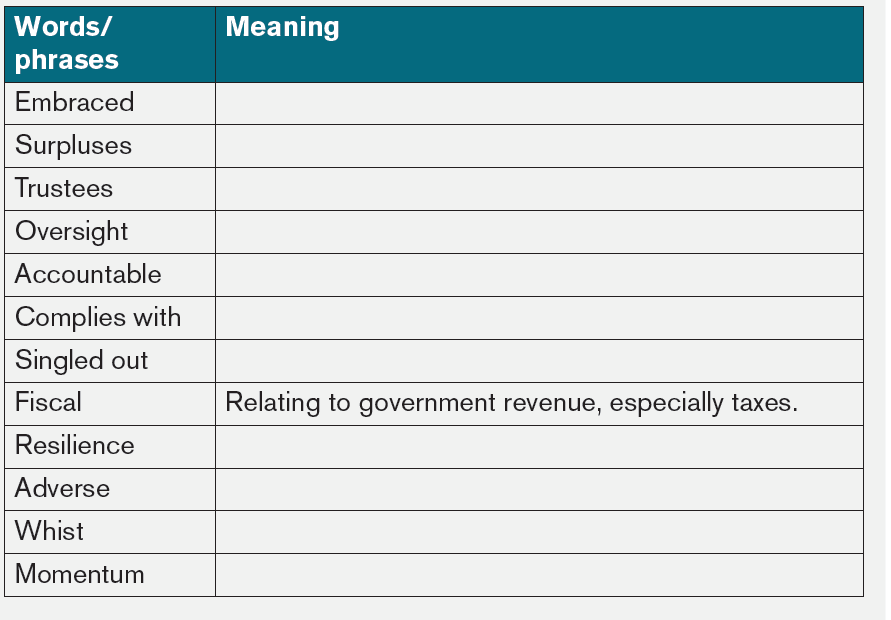
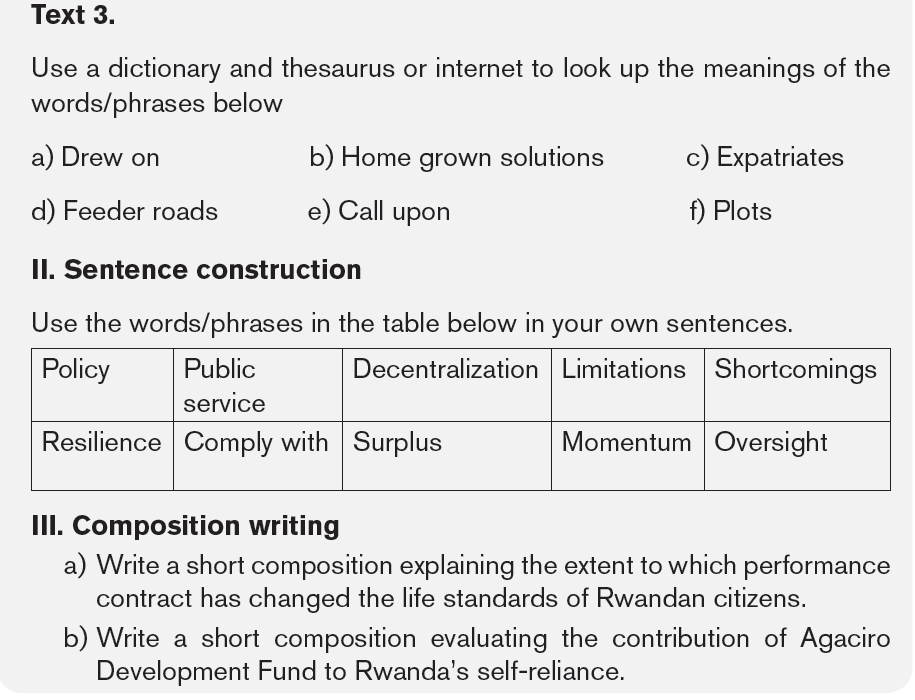
Text : National service in the United Kingdom (UK)
At the beginning in 1939, the national service enforced full conscription of
all males between 18 and 41 who were residents in the UK. It continued in
a modified form in peacetime by the National Service Act 1948. This Act of
Parliament extended the British conscription of the Second World War long
after the wartime needs for it had expired, in form of “National Service”. The
need for national service in the United Kingdom was inspired by the wartime
due to the need of more armed forces. The first phase of voluntary recruitment
was from 1916 to 1920 during the First World War and the second period from
1939 to 1960.
However, persons who were exempted from national service included the
following: medically unfit as well as the blind, disabled persons, and those with
mental disorders, British subjects from outside Britain who had lived in the
country for less than two years, students, persons employed by the government
of any country of the British Empire except the United Kingdom, clergy of any
denomination, married women, women who had one or more children of 14
years old or younger living with them, conscientious objectors, people working
in reserved occupations like baking, farming, medicine and engineering.
The National Service Act 1948 was applied to all healthy young men who were
not registered as conscientious objectors. It did not affect the exemption
from service of registered as conscientious objectors or the procedure for
registration.
The period of serving in national service in the United Kingdom varied due to
national interest. By 1946, the period of national service was 6 months and this
period was increased to 12 months in 1949. From this time, men who completed
the service remained on the reserve list for the number of years in the age-range
(four years) which started being counted from the moment they finished serving.
However, men on the reserve list could only be called for periods of up to 20
days (previous acts allowed the period to be indefinite), and could not be called
more than three times. In 1950, due to the British involvement in the Korean
War, the national service period was extended to two years. To compensate this
long period, the reserve period was reduced by six months.
In the United Kingdom, the national service was ended gradually from 1960. In
November 1960, the last men entered in service and the last national service
men left the armed forces in May 1963
(Adapted from History for Rwandan schools. Senior six student book, by Rwanda Education
Board).
•• Comprehension questions :
1. What would you tell about the National Service conscription in the UK?
2. How would you explain what inspired the need of the National service in
United Kingdom?
3. With example, justify some criteria followed in UK to participate in the
National Service.
4. Why the National Service period in UK was extended to two years in1950?
3.4. Language structure: Coordinate connectors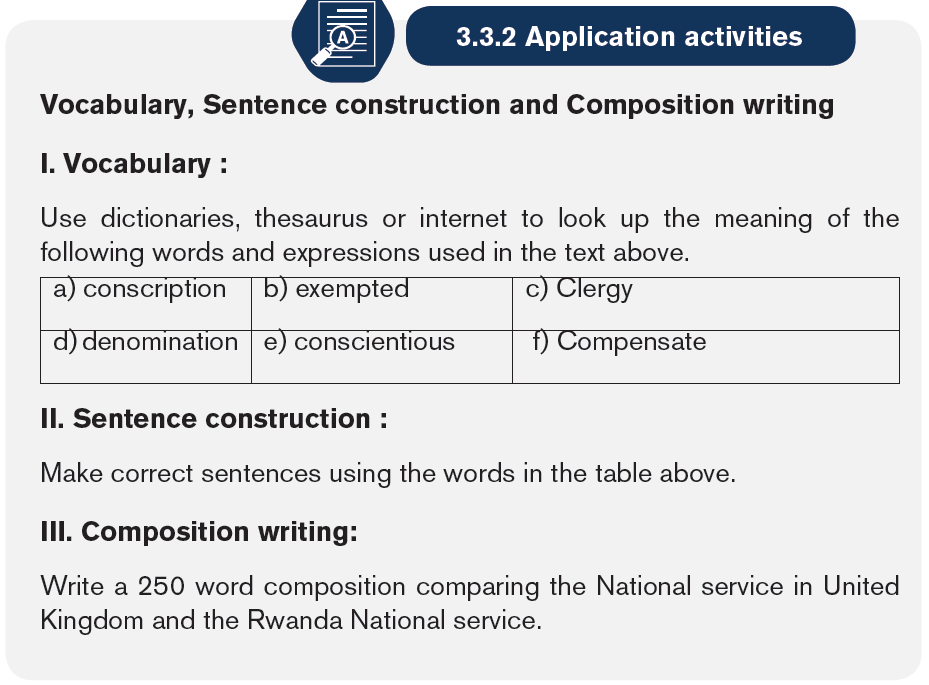
Coordinate connectors join two independent clauses together. Their purpose
is to show the connection between two words, actions, ideas, items in a series
56
and complete sentences. The most common examples are: and / or/ nor/ so /
but/ for/yet. The following table summarizes how coordinate connectors areused.
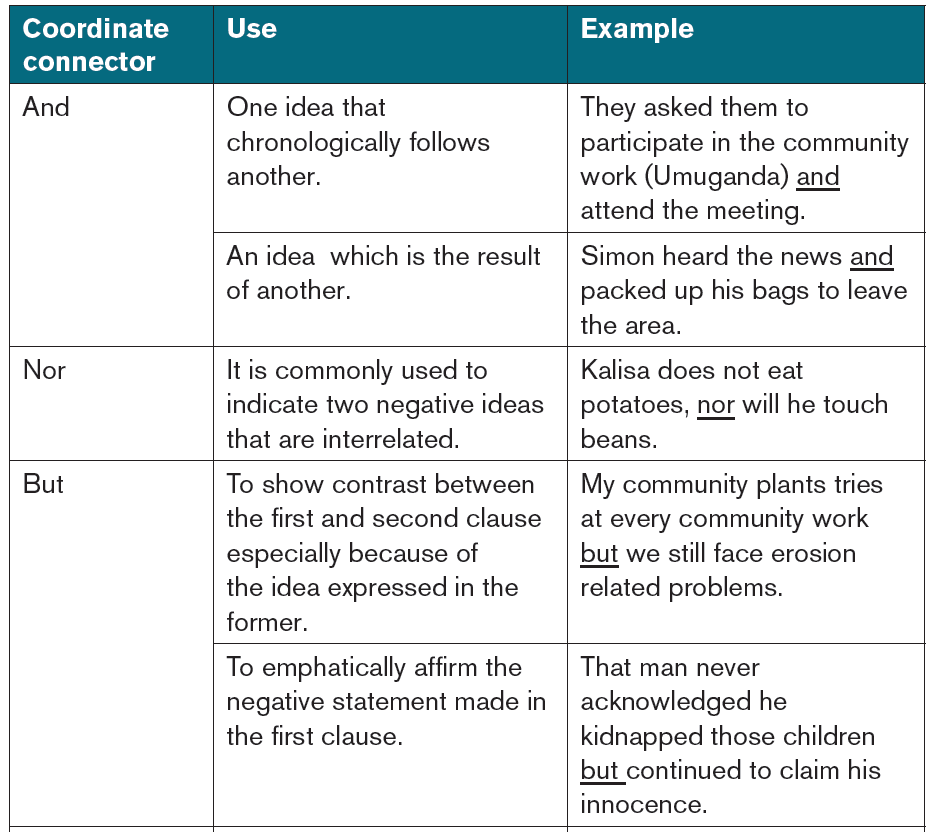
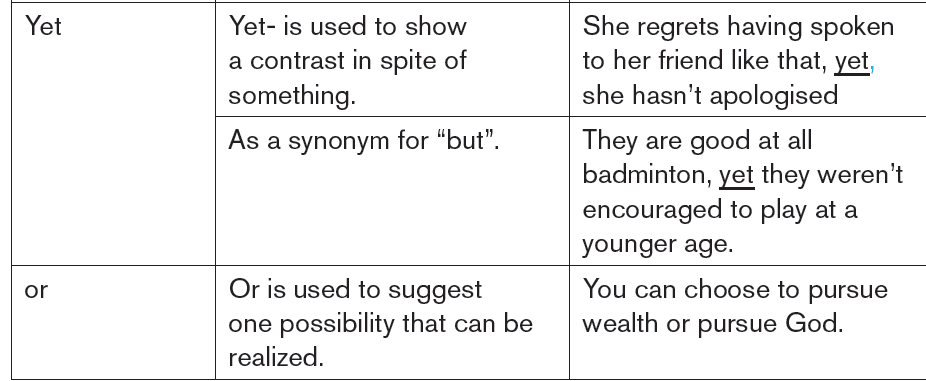

Exercise : Choose the best answer from brackets to complete each sentence
1. Would you rather have cheese ………honey on your sandwich? (For,
nor, or, so)
2. His favourite sports are football……….tennis. (or, and, nor, for)
3. I wanted to go to the beach,………Mary refused. (but, or, so, for)
4. I am allergic to cats, …I have three of them. (or, for, yet, so)
5. I am a vegetarian,……. I don’t eat any meat. (so, yet, nor, but)
6. Thomas will be late to work,………he has a dental appointment. (but, or,
for, nor)
7. Jennifer doesn’t like to swim,……….does she enjoy cycling. (and, or, but,
nor)
8. Jackson wanted to eat another piece of cake,…………he was on diet. (
for, but, yet, so)
3.5. Spelling and pronunciation
A. Spelling : Identify and correct misspelled words in the following
paragraph
Agaciro Development Fund is managed by the Board of Trustes that was
appointed by the Cabinette on 28 March 2014. The Trustees are experienced
persons with a variety of expertise in different areas of economy who are
appointed from public and private secter. The Board is responsible for the
oversight and management of the Fund’s operations on behalf of Rwandans.
The Board is acountable to the Government of Rwanda, through the Ministry
of Finance and Economic Planning, in ensuring that the Fund conplies with
the law and the highest standards of coroporate governance. On daily basis,
the operations of the Fund are run by the management headed by the Chief
Executive Officer who is also acountable to the Board.
B. Phonetic transcription
Give the missing phonetic transcription of the words in the table below andpractise pronouncing them correctly.
